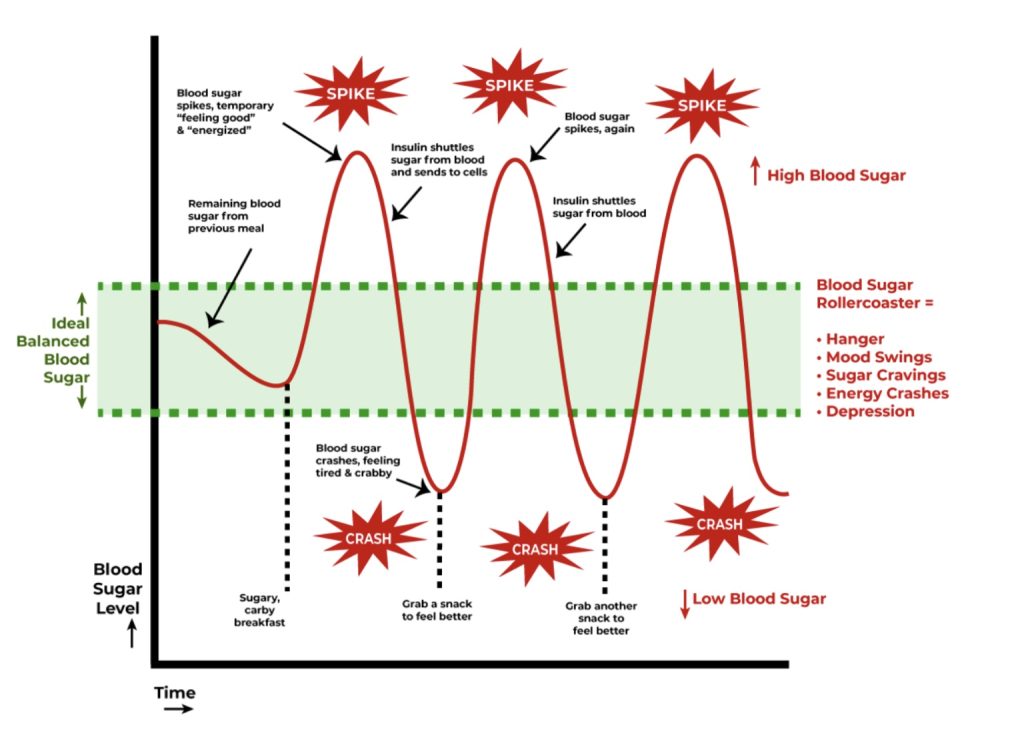When managing the multiple symptoms associated with chronic fatigue and fibromyalgia in addition to just getting through the day with the crippling fatigue that comes with these conditions it is difficult to not be overwhelmed. One thing that is important to not overlook however is managing blood sugar levels. Recognising how your body processes energy can play a huge role if how you can feel day to day.
Energy highs and crashes
If you have ever had a mid-morning coffee and pastry, felt great for an hour, and then crashed into brain fog, and fatigue, then you have experienced the blood sugar roller coaster. When you are already experiencing the debilitating symptoms of chronic fatigue and fibromyalgia then these dips will make the existing symptoms far worse. Instead of steady energy throughout the day, you get sudden exhaustion, irritability, dizziness and worsening of pain.

Why blood sugar regulation is especially important
- Mitochondria and energy production – Research suggests that people with CFS/ME and Fibromyalgia may have issues with how their cells produce energy. If there is blood sugar dysregulation with spikes and crashes this will negatively impact mitochondrial function.
- Inflammation and pain- Spikes in blood sugar can increase inflammatory processes in the body. Fibromyalgia already involves heightened pain sensitivity so keeping blood sugar levels stable may support a reduction in pain.
- Stress hormones- Every time your blood sugar crashes, your body releases cortisol and adrenaline to bring it back up. Over time, this adds to the stress load on the nervous system, which is already struggling in chronic illness.

Practical ways to keep blood sugar steady and support well being
- Balance your plate- optimise ratio of protein, healthy fats, and fibre. Unrefined/whole grains rich in fibre and known as complex carbohydrates such as buckwheat, pearl barley, wholemeal bread, rye bread, brown rice, sweet potatoes, quinoa, bran, nut flours, whole grain pasta, and varieties made from legumes should be chosen instead of refined carbohydrates such as white bread, rice, and pasta. These complex carbohydrates take the body longer to digest and cause blood sugar levels to rise more steadily, supporting blood glucose levels.
Healthy protein sources are lean meats, fish, eggs, nuts, seeds and plant-based options such as tofu, tempeh, and legumes. Milk, cheese and yogurt provide protein and calcium. Balancing the carbohydrate content of the meal with protein can help lower blood sugar levels than if carbohydrates are eaten alone.
Healthy fats will also support blood sugar levels, and these can be obtained from avocados, nuts, seeds, fatty fish and oils for cooking and dressing food. My personal favourite is extra virgin olive oil. It contains heat stable mono saturated fats and natural antioxidants that prevent it from forming harmful compounds when heated to high temperatures. Choose a superior quality one with lovely “sludge” in the bottom. This is full of antioxidants and beneficial polyphenols.

- Reduce intake of free sugars and high glycemic index foods.
These will both give a short-term lift in energy but often with the resulting harder crash.
- Limit caffeine.
This too will give a short-term lift followed by a crash.
- Do not skip meals.
Long gaps between eating can trigger blood sugar dips causing shakiness and fatigue.
- Snacks that work for you.
A handful of seeds, nuts, hummus with crudités, or apple slices with peanut butter are all good options.
What the research says
There is growing evidence linking metabolic health with fatigue and pain. Some studies studies suggest that people with CFS/ME show abnormalities in glucose metabolism and insulin sensitivity (Comhaire, 2020). Other research has found that stabilising blood sugar may support pain and fatigue symptoms in fibromyalgia (Zetterman, 2021).
Managing blood sugar levels won’t cure chronic fatigue or fibromyalgia, but it can remove one layer of stress from your system. Think of it as giving your body a steadier platform to work from. Even small changes like adding protein to breakfast or swapping refined carbohydrates for complex carbohydrates may make a noticeable difference to energy and pain levels over time.
